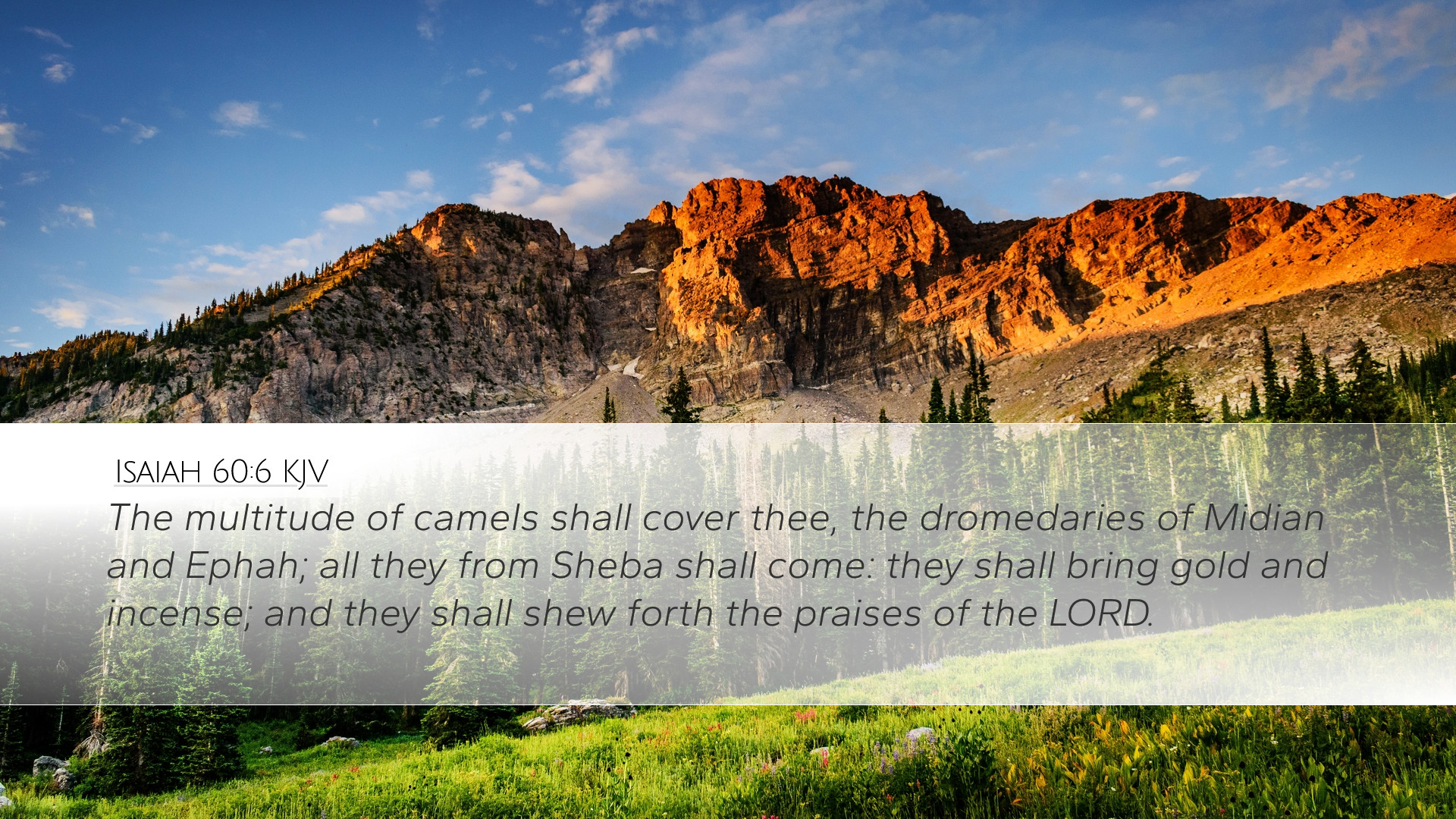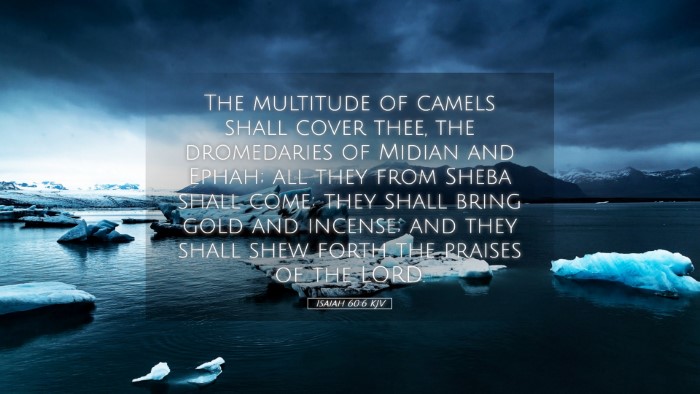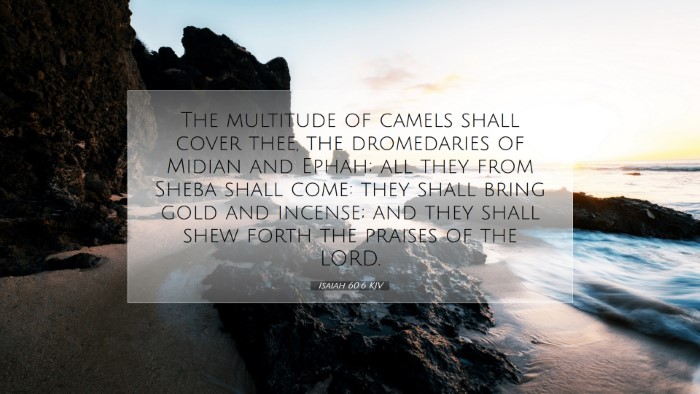Commentary on Isaiah 60:6
Isaiah 60:6 states: "The multitude of camels shall cover thee, the dromedaries of Midian and Ephah; all they from Sheba shall come: they shall bring gold and incense; and they shall show forth the praises of the LORD." This verse is a splendid proclamation of God’s promised blessings to His people, particularly symbolizing the ingathering of nations and the offerings they bring to the Lord. The insights from respected public domain commentaries provide a deeper understanding of the text.
Overview of the Context
Isaiah 60 is a chapter that envisions the restoration and brightness of Zion. This prophetic vision presents a future time when nations will respond to God's glory resting upon His people. The preceding verses set the tone for the exciting display of God's favor and the consequent response from the Gentiles.
The Multitude of Camels
The specific mention of camels in this passage is significant. Camels were valuable assets in ancient trade, representing wealth and abundance.
- Matthew Henry: He highlights that the multitude of camels signifies an influx of people and resources, indicating an era of unprecedented prosperity for Israel.
- Albert Barnes: Barnes comments on the geographical significance, noting that camels from Midian, Ephah, and Sheba represent the vastness of the nations that will acknowledge the true God.
- Adam Clarke: Clarke elaborates that these gifts symbolize not just financial wealth but also a recognition of God’s sovereign rule extending beyond Israel.
The People from Midian and Ephah
Midian and Ephah were regions known for their commerce and trade. In this prophetic message, they symbolize the Gentiles who will come to worship and recognize God's majesty.
- Matthew Henry: He discusses how the mention of these regions reflects the far-reaching impact of God's glory, drawing all nations to Him.
- Albert Barnes: Barnes points out that this invitation to the nations stresses the inclusivity of God's salvation—a theme prevalent throughout the Scriptures.
- Adam Clarke: Clarke emphasizes that the gathering of these nations serves to illustrate God’s power in overturning long-standing prejudices held by Israel against those perceived as outsiders.
Gold and Incense
The act of bringing gold and incense is laden with symbolism and theological implications.
- Matthew Henry: He interprets the gold as a representation of the kingly authority of Christ, and the incense signifies the prayers and praises of the nations rising before God.
- Albert Barnes: Barnes asserts that these offerings symbolize the responses of grateful hearts who come to worship the true God, acknowledging His dominion and benevolence.
- Adam Clarke: Clarke connects the act of bringing offerings to the fulfillment of prophetic expectations regarding the Messiah, recalling the gifts brought by the Magi in the New Testament, which parallels this prophetic vision.
Showing Forth the Praises of the LORD
The conclusion of this verse speaks to the ultimate purpose of the gifts brought from afar: to glorify God.
- Matthew Henry: Henry remarks on the importance of praise in the life of believers, asserting that all actions, including offerings, ought to culminate in glorifying God.
- Albert Barnes: Barnes emphasizes that this act of showing forth praises encapsulates the response of nations to God's glory, reflecting a universal acknowledgment of His sovereignty.
- Adam Clarke: Clarke points out that this emphasizes the ultimate goal of all worship—acknowledgment of God’s greatness and grace, which is meant to inspire others toward faith.
Theological Implications
This verse holds significant theological implications for understanding God's plan for redemption and the inclusion of all nations in His salvific purposes.
- Inclusivity of Salvation: The promise of Gentile nations flocking to Zion underlines the breadth of God’s mercy, anticipating the final fulfillment seen in New Testament events such as the Great Commission.
- The Anticipated Kingdom: This imagery reflects the eschatological hope that all creation will ultimately recognize God's authority, showcasing the anticipated kingdom as a place of diverse peoples united in worship.
- Faith in Action: The actions of bringing offerings are practical demonstrations of faith; they show that belief in God compels one to act and respond appropriately, emphasizing that worship involves giving and service.
Conclusion
Isaiah 60:6 invites pastors, students, theologians, and Bible scholars to reflect on the rich tapestry of God’s redemptive plan that transcends cultural and national boundaries. As the multitude of nations bring their offerings to Zion, they not only bless Israel but are also transformed in their recognition of God's glory. This prophetic vision resonates with the call for all believers today to participate actively in worship, service, and the proclamation of God’s greatness, both in word and deed.


